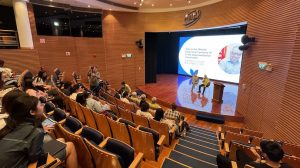IFTM is proud to promote diversity and multiculturalism. Each year, dozens of young people from outside Macao enrol at the Institute for full-time study or arrive on exchange programmes. Finalist Abdul Basit Qureshi is unique. He is the first Muslim to join IFTM’s Culinary Arts Management Bachelor Degree Programme and is now preparing to graduate.
It took a leap of faith for Basit to leave Pakistan and study culinary arts in a largely non-Muslim community. “I had lots of worries before I came to Macao,” he says. “But IFTM’s management always helped me throughout the way, in every aspect.”
The Culinary Arts Management Programme was launched in academic year 2011/2012 and the first class graduated in 2015. Basit enrolled in academic year 2016/2017.
Islam has guidelines for food considered permissible to be eaten. Food that adheres to Islamic law is considered halal, as described in the religion’s holy book, the Koran. There are particular ways of slaughtering animals used for food, and how to clean and store kitchen equipment and utensils.
Basit says the Institute’s support meant he could meet his religious beliefs throughout the 4-year programme. “I didn’t really encounter any problems, not in terms of my studies nor my daily life, and not particularly when I was doing my culinary courses,” he says.
The Institute made an all-out effort to help Basit during his studies, particularly during cooking training.
Chef Hans Lee Rasmussen, Chef de Cuisine at the IFTM Educational Restaurant, is full of praise for Basit’s hard work and creativity. “I worked in Copenhagen many years ago, and many staff members there came from Pakistan, so I knew pretty well about halal ingredients and Muslim needs in terms of kitchen equipment,” Chef Rasmussen says.
Pork is forbidden in Islam but is a common ingredient in Chinese and European cooking, and frequently used throughout Macao and Macanese cuisine. “It’s not only about eating, but touching as well, which means Muslim staff members need frying pans or pots that are not used to handle pork,” Chef Rasmussen says.
As demanding as it was for Basit to be trained as a culinary arts professional without ever touching pork, he was up to every challenge. The same happened with alcoholic drinks: they are banned in Islam and so off the menu in cooking. “I like using wine in preparing my dishes,” Chef Rasmussen says. “Though Basit could not use wine to cook, he was able to make really good dishes and to find perfect substitutes.”
A window to more
Basit says he applied to IFTM to follow his dream to become a professional in culinary arts. “My brother was in China at the time, so I tried to search for suitable schools in the area and found out that IFTM was highly recommended,” he says.
At IFTM, Basit learned about cooking skills and much more, as the Culinary Arts Management Programme covers a number of other topics. “During a course in Year 3, we were asked to design a whole menu and to manage the IFTM canteen for an entire day,” he recalls. “It was a challenging task but at the same time a really memorable moment.”
Basit is assessing his opportunities as his time at IFTM comes to an end. He has plans to further his studies but has also delivered some applications to join the industry. “Whatever comes first, I will take that,” he says. Staying in Macao to kick-start his professional career is a priority. “If there is any chance, I want to stay here.”
He strongly recommends studying at IFTM for anyone with a passion for the culinary arts, particularly young Muslims. “For young Pakistanis who are interested in the industry, I would recommend they come to IFTM, for the Institute offers good education quality and adequate support of all kinds,” he says.









